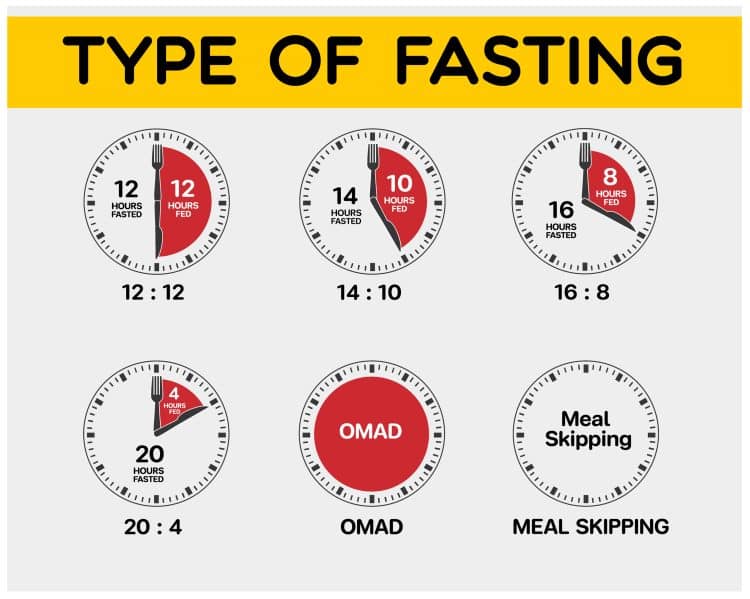The ideal fasting duration varies, but generally, fasting for 12-16 hours effectively stimulates fat breakdown, releasing ketones for energy and promoting weight loss, as supported by numerous studies.
While fasting methods such as intermittent fasting and water fasting are quite common, different fasting options and diets that keep surfacing make it confusing for people.
Intermittent fasting (IF) has evolved as a popular fasting method with many variations, allowing you to tweak it to your needs and lifestyle.
Given the wide range of intermittent fasting (IF) choices, many beginners often wonder about the optimal length of a fasting period.
Fasting time can significantly affect your fitness or weight loss goals. Many believe that the length of your fast is the key to achieving your health goals smoothly and sustainably.
For someone trying to prioritize health in a fast-paced life, the trick to successful fasting is finding an appropriate method. You should select the one that suits your preferences.
Level Up Your Fitness: Join our 💪 strong community in Fitness Volt Newsletter. Get daily inspiration, expert-backed workouts, nutrition tips, the latest in strength sports, and the support you need to reach your goals. Subscribe for free!
So, if you plan to begin fasting, the first step would be to understand the available fasting choices and determine which one to adopt for optimal results. The 16:8 intermittent fasting method is among the most popular to lose weight.
This article will help you explore why time plays a vital role in your fasting plan, how to derive the best results, what things help determine the fasting time, and how to make fasting a viable and safe option to meet your health goals.
How to Determine Your Ideal Fasting Time?
Once you’ve decided to start intermittent fasting, the next step is determining the fasting duration.
The optimal fasting time for each individual can vary depending on their current health and objectives. It’s important to recognize that a one-size-fits-all approach to fasting durations may not be suitable or ideal for everyone.
Some individuals can comfortably fast for 20 to 24 hours daily, while others might find moderate fasting periods of 12 to 18 hours more manageable. Recent research indicates that 16-hour and 24-hour fasts may help prevent chronic diseases over the long term. (1)
Research suggests that the benefits of fasting vary for many people and often depend on the length of the fast. (2)
Fasting for prolonged periods may not always be the best option as it can leave you feeling lightheaded, hungry, irritable, and weak with low energy levels. Moreover, it can get worse if you indulge in compensatory overeating after a long fast.
You can experiment with different fasting durations. If you are new to fasting, you can opt for IF patterns with a relatively smaller fasting window. For example, 12:12, 14:10, 16:8, or 19:5 are feasible fasting schedules for different individuals. If you are looking for weekly plans, try the 5:2, alternate-day fasting, or Eat-Stop-Eat methods.
For more intense fasting regimes, consider options like the warrior diet (20:4 hours IF) or the one-meal-a-day diet (OMAD) for intense fasting plans.
When starting a new fasting plan, it is important to note how your body feels and responds to the fasting regimen. It will help determine the optimal fasting time for you. Notably, the duration is subject to change depending on different situations.
For example, on days when you don’t exercise, your body conserves energy as it burns fewer calories. Therefore, on these less active days, you might find that your body can handle longer periods of optimal fasting than when you engage in workouts. Moreover, changes in your sleep cycle, stress levels, and other lifestyle factors could also influence the optimal fasting time.
Popular Fasting Durations
Level Up Your Fitness: Join our 💪 strong community in Fitness Volt Newsletter. Get daily inspiration, expert-backed workouts, nutrition tips, the latest in strength sports, and the support you need to reach your goals. Subscribe for free!
While determining the ideal fasting duration for best results, you can take cues from the most popular fasting patterns. Remember that your body is unique, and a safe and appropriate fasting plan should not cause unwanted fatigue or restlessness.
Among the time-restricted feeding regimens, the 16:8 IF diet is quite common. It involves fasting for 16 hours a day while allowing an eating window of eight hours. While you can choose the feeding and fasting windows at your convenience, most people eat between 10 am and 6 pm, 11 am and 7 pm, or 12 pm and 8 pm. Some studies show fasting periods tuned to your circadian rhythm can work better. (3)
The reason behind the popularity of 16:8 IF is the sustainable timings of fasting and feeding that make it easily adaptable. Fasting 16 hours every day can work as your optimal fasting length. Moreover, it provides enough time to keep active, engage in workouts, and refuel your body pre- and post-exercise.
Whether you opt for an 18- or 24-hour fast, it’s advisable to tailor your fasting schedule and duration to match your fitness objectives. For individuals fasting for weight loss, you can look for fasting lengths that allow you to control your overall caloric consumption. Moreover, it should not choke your appetite to the extent that it results in overeating when it’s time to break your fast.
A moderate fasting length (neither too long nor short) makes a sustainable regime. However, longer fasting durations are a better choice if you aim to reduce inflammation and oxidative stress and seek autophagy benefits (4). Longer fasts could be more challenging, although they can be more effective in achieving desired fasting outcomes.
Tips For Safe Fasting
Regardless of the chosen fasting method and time, you must exercise caution to ensure maximum benefits. Here are a few tips you may want to consider.
- Don’t overdo fasting hours: Keep the fasting duration short (12-24 hours), especially if you are new to fasting. It will allow your body to gradually adjust to fasting without complicating it. Beginners can choose between 5:2, Eat Stop Eat, 16:8, or alternate-day fasting. Seek medical supervision when increasing your fasting periods to 72 hours, like in water fasting.
- Limit food intake on fasting days. Opting for calorie restriction may be more effective than completely abstaining from food. Therefore, you could choose a practical intermittent fasting duration that allows you to eat within a shorter time frame, helping to reduce your overall food intake. That would make a more sustainable fasting approach and reduce the risks of side effects while keeping hunger at bay.
- Stay hydrated: Whether you fast for 12, 24, 48, or 72 hours, drink plenty of water during the fasting and feeding periods.
- Avoid breaking fasts with big meals: Fasting should not end with a high-calorie feast as this can leave you feeling bloated and add to the total calories consumed. Instead, opt for light and simple food to break a fast.
- Discontinue fasting if you feel unwell or weak: Seek medical help if you experience discomfort or sickness from fasting.
- Add whole foods and protein to your eating window: Protein and whole foods can reduce your unwanted cravings as they keep you fuller for longer. Moreover, it helps avoid refined and processed foods.
- Include exercise, walks, yoga, and meditation in your fitness routine: Regular workouts not only support your fasting goals but can also bring more discipline in maintaining the well-being of your overall physical and mental health.
Is Fasting the Best Practice for Weight Loss?
While there are several fasting methods you can choose from, not every method is equally safe or effective for achieving long-term weight loss. Fasting results depend on many factors and can vary from person to person. Plus, you must ensure you do not overly limit your calorie intake during the feeding period.
Limiting too many calories may not be a sustainable way to maintain a healthy weight, as it can increase your appetite and slow your metabolic rate. (5)
Running a calorie deficit is key to successful weight loss. Depending on your fitness goals, daily activities, and other health factors, your dietician could help you identify your caloric requirements. Typically, this could vary depending on your current BMI, weight, age, height, and weight loss goals.
Although fasting can deliver several health benefits, it may not be for everyone. If you’re unsure of any underlying health issues or have been on medication for pre-existing ailments, it is best to consult a medical professional before starting any new diet.
FAQs
What is the best fasting length?
There is no one fasting length that would work for all. The fasting duration could vary according to your health goals, medical conditions, and other factors. While shorter-duration fasts offer relatively fewer benefits, prolonged fasting regimes are challenging but provide more benefits. The 16:8 and 24-hour fasting methods are popular due to the ease of integrating them into one’s lifestyle.
Are there any side effects of prolonged fasts?
Most intermittent fasting patterns are considered safe, but prolonged fasting could impact your health adversely, especially if you have any underlying medical condition or are on medication. Seek a doctor’s clearance before starting a new diet regimen.
What is the optimal fasting time for first-timers?
If you are fasting for the first time, consider starting with a time-restricted fasting method such as intermittent fasting. Beginners should choose a 12-hour fasting window to begin with. Beginning with a long fasting window as a beginner is a bad idea.
Can I change my fasting schedule?
Yes, you can change your fasting times based on how your body responds to the chosen fasting method. Once you are comfortable with a shorter fasting period, you can gradually move to a longer fasting duration. The flexibility of methods like intermittent fasting enables you to discover a schedule that best fits your needs, allowing you to identify your ideal fasting duration.
Concluding Thoughts
Regardless of your fitness goals, avoid stretching the fasting period to the point of discomfort, especially if you feel unwell. Begin with a shorter timeframe and try one fasting pattern at a time, as it helps you differentiate and analyze how your body responds to different fasting methods.
If you’re new to fasting, beginning with shorter durations of intermittent fasting is a good approach, as it allows your body to adjust to the fasting periods gradually. Suppose you’re considering experimenting with how your body reacts to fasting over three months during your weight loss journey. In that case, choosing a fasting technique that you can comfortably adhere to for the entire duration is advisable. Most importantly, stay dedicated and focused to achieve the best results.
Since IF offers several methods, you can adopt the trial-and-error method to determine your optimal fasting duration. Starting with smaller fasting periods and gradually increasing the duration should be the best approach for most people.
References
- Horne, B.D. (2020) Considerations for the optimal timing, duration, frequency, and length of an intermittent fasting regimen for health improvement, Nutrients. Available at: https://www.ncbi.nlm.nih.gov/pmc/articles/PMC7551479/ (Accessed: 13 December 2023).
- Research on intermittent fasting shows health benefits (no date) National Institute on Aging. Available at: https://www..nih.gov/news/research-intermittent-fasting-shows-health-benefits (Accessed: 13 December 2023).nia
- Longo, V.D. and Panda, S. (2016) Fasting, circadian rhythms, and time-restricted feeding in healthy lifespan, Cell metabolism. Available at: https://www.ncbi.nlm.nih.gov/pmc/articles/PMC5388543/ (Accessed: 13 December 2023).
- Mandal, S. et al. (2022) Intermittent fasting: Eating by the clock for Health and Exercise Performance, BMJ open sport & exercise medicine. Available at: https://www.ncbi.nlm.nih.gov/pmc/articles/PMC8744103/ (Accessed: 13 December 2023).
- Most, J. and Redman, L.M. (2020) Impact of calorie restriction on energy metabolism in humans, Experimental gerontology. Available at: https://www.ncbi.nlm.nih.gov/pmc/articles/PMC9036397/#:~:text=Calorie%20restriction%20reduces%20metabolic%20rate,of%20high%20metabolic%20rate%20organs. (Accessed: 13 December 2023).











